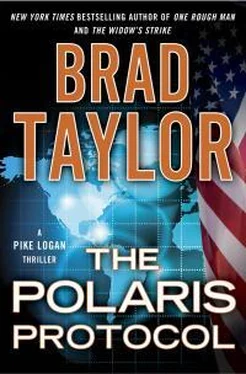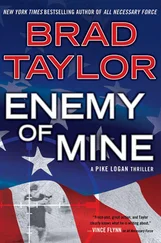The Ghost said, “If I agree, what’s the next step?”
Pike pulled two devices out of a bag, each a small black box the size of garage-door opener affixed to a metal band.
“These are GPS trackers. They’ll get fastened to your ankles underneath your pants. You’ll notice there are two of them, and that’s for a reason. The trackers will have a geographic boundary that I’ll program once we’re in the country. Each one also has a small explosive charge. If you exceed the boundary I’ve set, it’ll sever both of your feet at the ankles.”
The Ghost simply stared and Pike continued. “I told you it would be my job to prevent escape.”
52
Walking down the promenade of Motolinía Street, the sicario kept his pace the same as that of the shoppers around him, occasionally stopping to gaze into a window or buy a trinket. Wearing a hat and wig, he no longer looked like an apparition from hell, but instead blended in nicely with the multitude of tourists and locals out to enjoy the sunshine. His purpose was different, however. Having suspected a car following behind him less than thirty minutes ago, he was trying to determine if he was under surveillance. If he was being targeted by Los Zetas. Or perhaps the phantom gringo hit team from Tepito.
Originally, he’d planned on driving straight to the meeting place, leaving Booth taped and gagged in the trunk, but had opted to stop short and take the walk to the final destination. Having captured many men, he knew the tactics well and understood he was safer on foot, moving in a crowd.
It wasn’t the best of circumstances, as it left Booth to his own devices in the trunk while he was gone, but he was fairly confident he’d instilled enough fear into the man that he wouldn’t attempt to do anything rash. He’d told Booth what would happen should he attempt to escape. He’d kill him, plain and simple. Maybe slow, maybe fast. That all depended on the circumstances at the time. Either way, he’d take the life out of the man for disobeying, no matter where on earth he chose to run.
It wouldn’t be for vengeance or because of any emotion. It was just what he did. The only thing he did. He had no other skills, but the one he possessed was valuable, he knew. He watched soccer on TV and thought to himself that in his own way, he was just as good as the best players on the field. They kicked a ball, which was seemingly easy, but only one in a thousand could do what the men on the field could do.
It was the same with him. The sicario had seen the masterpieces hanging in the museums, painted by men who had a talent that defied description, and thought to himself that he was like them, only in a different type of art.
And he wasn’t wrong.
Walking up the promenade, he knew this skill meant little here. He was entering a world of strategy and negotiation where violence was of no use. The big question was whether the men Carlos had contacted really had money and the desire to purchase Booth’s protocol. Something he would find out in the next few minutes.
It had turned out to be relatively easy to locate the men. Leaving Booth chained in the bathroom, the sicario had returned to the airport and cornered a man who worked at the rental car counter he had seen the foreigners use. Knowing they had to have shown a passport and international driver’s license, he’d bullied the rental clerk into divulging that information. From there, he’d contacted an informant for Los Zetas who worked in the immigration department at the airport. Someone who’d provided information in the past for cash.
The contact was a risk, because the man could just as easily tell others in Los Zetas that he’d shown his face, along with the information he’d sought, but he didn’t see any other way around it, and the danger was slim. The immigration agent had no idea of the ongoing status of Los Zetas, so his appearance would get back to them only as a coincidence.
For a single American fifty-dollar bill, the agent had given him the inn the three men had provided on their immigration cards. A midlevel hotel in the Zona Rosa.
He talked to reception at the hotel, and a couple of twenty-dollar bills later, he had the room number of one of the men. He’d slipped an envelope under the door with his cell phone number and had waited.
The man had eventually called, as the sicario knew he would, and they’d arranged for an initial meeting. The sicario had picked a famous restaurant and bar called La Opera, near the tourist section of the Zócalo. Unlike previous occasions, when he was a valued member of Los Zetas, he didn’t want to meet anywhere near their territory. He’d chosen the Zócalo because of its proximity to the presidential palace and other government buildings—meaning tight security. For once, he feared his own associates more than the officials who hunted them.
He reached the corner of 5 de Mayo and took a left, leaving the walking promenade behind, fairly certain that nobody was still following him, if anyone had been at all. He passed by the entrance to La Opera and continued to the next block. He stopped, standing next to a vendor selling tacos and studying his back trail. Nothing suspicious appeared. He looped around and entered the restaurant, his eyes taking a moment to become accustomed to the gloom.
Like the streets outside, the bar was starting to pick up, the late-afternoon crowd hitting happy hour as in bars all over the world. He’d picked this time specifically because the streets would soon be packed with vendors selling everything from “handmade” sombreros to watches and packs of gum. A sea of people that he could escape within, should it become necessary.
A man in traditional Mexican attire, complete with a sash, approached and asked how he could assist. The sicario said he was meeting someone, and before the host could respond, a swarthy gentleman came forward, speaking in English. “Do you wish to have a margarita?”
The sicario responded, “No. A glass of water would be fine.”
The restaurant host looked confused, but the swarthy man smiled and stuck out his hand. The sicario shook it, pleased that the foreigners had the ability to follow instructions.
Each now sure the other was whom they were supposed to meet, they moved to the table already obtained by the foreigner. After sitting, the man said, “You may call me Farooq. It means ‘one who distinguishes truth from falsehood.’”
The sicario smiled and said, “As in ‘one who will not pay for something that doesn’t work’?”
“Yes. That’s about the sum of it.”
“You may call me Pelón.”
“And what does that mean?”
“A man with no hair.”
Farooq looked confused, as if there was a hidden meaning, and the sicario said, “It’s just a nickname. If you’d prefer something with substance, something that’s closer to my nature, you may call me Muerte.”
“Which is?”
The sicario rested his eyes on him, and Farooq instinctively recoiled from their weird glow, as they all did, no matter the nationality. “Death. I am death.”
Farooq said, “As in you’ll kill me if I don’t pay for services rendered? Really? Trust me when I say your threats mean nothing to me, and it’s not how I like doing business.”
The sicario said, “I mean no threat. You asked. It’s simply who I am.”
Farooq said nothing for a moment, and the sicario let the silence stretch, not concerned. Eventually, it was Farooq who broke it. “So now you have this protocol? What happened with Carlos?”
“I killed him.”
Farooq searched the sicario’s visage for the bluff but was left wanting. He made a move to stand, saying, “I’m not sure I can continue, under the circumstances.”
The sicario caught his wrist and said, “Don’t leave. I have what you want. Carlos was but an impediment. You shouldn’t care who profits, only that you get it.”
Читать дальше












